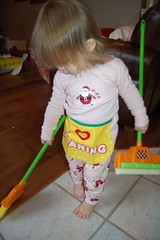Let me repeat that: this is worth it!
A Good Beginning
If you haven't already begun doing chores, it's important to explain your expectations. Doing chores is not the parents taking a promotion; it's having the kids contribute to a happy household. We all have to do work around the house. Sit the children down and explain this. If you're using a chore chart, unveil it and explain it here. If you're withholding privileges and/or offering rewards (more about both later), explain those systems here, too.
As we mentioned last time, clear expectations are key here as well. Young children (and even older children! Heck, even adults!) need to know exactly what's expected of them. You won't get results from taking a three-year-old to the door of a dirty bathroom and command them, "Make it clean." Show them step by step and help them with . . .
Understanding (& Patience)
I still remember what it was like to be a kid, and to look at a room filled with toys, and not know where to begin. Or a room that had all the big things picked up and think I was done, only to be instructed by my parents that I was nowhere near done.
Young children should not be expected to clean a room systematically or completely without explicit instructions, and often help and reminders. Cleaning isn't instinctual ;) . We're not just assigning them chores; we're teaching them how to maintain a household. A three-year-old is capable of scrubbing a toilet--but she may need it explained and demonstrated a couple (dozen) times.
Appeal to the Rules
Our household is run heavily by the rule of law: once we make a law (a rule), it rules (not our tyrannical wills, most of the time . . . whoops, my degree is showing). "I'm sorry, that's the rule," makes it sound like it's totally out of your hands--and any further appeals to you will be fruitless.
I'm pretty sure this is why rules were invented.
Withhold Privileges
I know, how cruel to make your children work for the privileges of playing computer games, seeing their friends, watching TV, etc. We're probably the meanest parents in the history of the world for doing things like this.
Reward Compliance
 I once heard a talk by a family counselor, and he said to immediately thank a child as soon as they begin to obey. But you can do more than thank your kids, too: when our kids do their chores, with the Family Do Dots system they earn scrip to use in a family "store" once a week. You might pay your kids an allowance. When we Wayward Girls were little, we got to pick out a piece of candy if we did our chores. Young children can be motivated by the smallest rewards.
I once heard a talk by a family counselor, and he said to immediately thank a child as soon as they begin to obey. But you can do more than thank your kids, too: when our kids do their chores, with the Family Do Dots system they earn scrip to use in a family "store" once a week. You might pay your kids an allowance. When we Wayward Girls were little, we got to pick out a piece of candy if we did our chores. Young children can be motivated by the smallest rewards.Choice & Accountability
Make chore time about their choices. They can choose to do their chores and as a consequence, receive privileges and rewards, or they can choose not to do their chores. Even adults don't get to choose the consequences of our actions!
Also under this, make sure the chores are completed and track this. Kids can tell if you're not really checking. (Spot checks can also be very effective.)
Teach Them to ENJOY the Results
Especially following a large task, like cleaning and organizing the toy room, have your children look around at what they've accomplished. They've cleaned this entire room. Help them not only understand the sense of accomplishment they should have, but also help them appreciate how nice the room looks, how easy it will be to find their toys, how much more fun they can have now that the room is clean. This end result is what we want, and if they can internalize that desire for themselves, it's helping them learn to work independently.
Posts in this series: 7 things every parent should know about kids' chores
Photo credit: two children cleaning—Michael Bentley; child cleaning—Amanda Westmont, via Flickr & Creative Commons




1 comment :
When we started homeschooling we decided that our kids would have to help around the house since I've had to spend so much time planning. My two younger kids are fine with it, but my oldest just doesn't have a servants heart. She's working on it! Thanks for the motivational tips.
Post a Comment